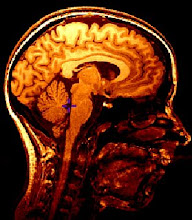Non Sequitur
I went to a sports medicine clinic today to get my knee looked at. After a lot of bending, poking, twisting, and prodding, I was told some interesting things. Firstly, and most importantly, there's no serious damage to my knee. While there's currently not a lot of pain, there is some swelling around the interior of my knee - the physiotherapist said it seems to be around the cartilage. I have some exercises to do to strengthen the muscles, and obvious advice to take it easy when my aerobics start up again.I also found out something rather worrisome. Apparently, my knee caps rest at an angle pointing out laterally rather than straight over the joint as they are supposed to do. This puts me at a higher risk for developing arthritis - the physio said she was even surprised I haven't had knee pain before this with all the sports I do. I'm a little upset over this because there's not much I can do to change it, though there are treatments available if (when) my knees start to bother me.
I finished A Million Little Pieces the other day - I rather enjoyed it. The style took a little getting used to: the no punctuation, short sentences, no indications of dialogue so you often don't know which character is speaking.
The reason why I enjoyed this book was obviously not because I could relate to the destructive consequences of addiction - but it really was a fascinating perspective of what it is like to embody a serious alcohol/drug addiction. The psychologist in me was intellectually moved by that aspect.
What moved me on a more emotional/personal level, was Frey's position towards AA and the Twelve Steps. AA is a system that bases it's methods on a belief in a Higher Power. So the dilemma arises when an individual has no faith in a Higher Power - many proponents of AA will firmly assert that there is no other way to sobriety.
Frey did not believe in God/Higher Power, and instead chose his own path of recovery: taking responsibility, a commitment to one's own decisions, strength of will, and self confidence.
I relate strongly to that - the fact that you don't need faith in divinity to take control of your own life. You don't need to live this life in preparation for an afterlife. The purpose of life is to live, and to live for yourself. I wasn't expecting to find a message like that in a book listed on Oprah's Book Club, heh.
Listening to: Trouble - Ray LaMontagne



